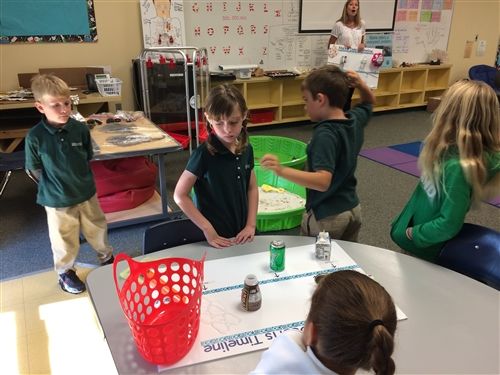

First Grade Talks Trash
Source/Author: Susan Owen, First Grade Teacher
April 27, 2017
First grade’s in-depth study of the ocean has been driven by the question, "Why are oceans important and how do we affect the oceans?"
So far, they've learned the oceans cover more than 70% of Earth. Oceans provide a major food source for the people and animals of the world, are home to marine life, and are fun as they provide lots of recreation for people!
Recently, first grade had a fabulous guest expert from the Marine Exploration Center, Melissa Dude, whose presentation "Let's Talk Trash!" was at the absolute center of their study. The entire focus was on the driving question. They saw how trash enters the ocean and becomes debris. They saw why it's harmful, especially to marine life, as they mistake trash for food. Marine debris smothers their homes and some marine life dies by getting caught in trash.
First grade marine scientists worked in teams to place commonly disposed-of items on a timeline at the "age" they thought the item would biodegrade or breakdown. They were amazed and disheartened to see how long it actually takes for that process to happen. They learned that once trash enters the ocean, it is there for a very long time, maybe forever. Marine debris takes weeks and even years to biodegrade and some items never biodegrade.
So, what can we do? Make wise choices!
(More photos here.)
So far, they've learned the oceans cover more than 70% of Earth. Oceans provide a major food source for the people and animals of the world, are home to marine life, and are fun as they provide lots of recreation for people!
Recently, first grade had a fabulous guest expert from the Marine Exploration Center, Melissa Dude, whose presentation "Let's Talk Trash!" was at the absolute center of their study. The entire focus was on the driving question. They saw how trash enters the ocean and becomes debris. They saw why it's harmful, especially to marine life, as they mistake trash for food. Marine debris smothers their homes and some marine life dies by getting caught in trash.
First grade marine scientists worked in teams to place commonly disposed-of items on a timeline at the "age" they thought the item would biodegrade or breakdown. They were amazed and disheartened to see how long it actually takes for that process to happen. They learned that once trash enters the ocean, it is there for a very long time, maybe forever. Marine debris takes weeks and even years to biodegrade and some items never biodegrade.
So, what can we do? Make wise choices!
- Reduce by using reusable items so there is not so much waste.
- Reuse by stopping the use of single use items, bringing our own water bottles, and packing our lunches in reusable containers.
- Recycle by making sure we place recyclable items in the recycle bin and dispose of trash properly.
(More photos here.)
























